Remove not the ancient landmark, which thy fathers have set.
Proverbs 22:28 KJV
In ancient Israel, landmarks meant more than marking property. They served as sacred boundaries. People placed these stones with a purpose—to define land ownership, inheritance rights, and maintain social order. As a result, they preserved peace, upheld justice, and protected generational legacies.
To move a landmark wasn’t just dishonest. It directly violated a covenant. It disrupted the structure God had established through the wisdom and obedience of those who came before. Such actions reflected rebellion, not just against men, but against divine authority.
These markers also held deep spiritual meaning. They pointed Israel back to God’s laws and promises. They represented the principles He designed to shape community life. So when people tampered with them, they didn’t just disobey—they dishonoured their heritage. They replaced clarity with confusion. In God’s eyes, this was a serious offence, not a small misstep.
Even though we don’t rely on physical stones today, the principle still stands. We now have spiritual, moral, and doctrinal boundaries—truths passed down through Scripture and guarded by faithful believers. These include the authority of God’s Word, the sanctity of life, the definition of marriage, the call to holiness, the reality of sin, and salvation through Jesus Christ alone.
Unfortunately, many of these truths are slowly fading. This shift doesn’t always happen through open rebellion. Often, it begins subtly. In our desire to stay accepted, relevant, or less offensive, we start questioning what God already made clear. Over time, we reinterpret truth to match our comfort. We gradually lean on old convictions until they collapse under pressure. And because the changes are slow, we hardly notice—until the landmark has disappeared from its place.
What was once sacred now feels outdated. Standards that upheld righteousness are now called restrictive. Convictions quietly turn into conveniences. Consequently, the church in many places no longer stands as a pillar of truth. Instead, it reflects the culture it once aimed to transform. As the boundaries move, confusion follows. Families crumble. Society loses its direction. Faith becomes a personal choice rather than a firm conviction.
This issue goes beyond cultural trends—it’s a deep spiritual crisis. When we shift the landmarks, we lose our way. We disconnect from the voices of wisdom that guided us and from the God who originally set those boundaries. The ancient paths aren’t obsolete. On the contrary, they form the solid foundation for true faith and a meaningful life.
Living it Out
Take time to reflect: Are you guarding the ancient landmarks, or gradually moving them?
Return to Scripture as your foundation. Let God’s Word define your convictions, not trends or opinions. Boldly stand for what’s true, even when it’s unpopular. Teach the next generation to value God’s standards. Honour the spiritual heritage passed down through faithful lives.
Though the world continues to drift, you don’t have to. Stand your ground. Guard the landmarks. And let your life show the world that truth still has a place—and it does not move.

